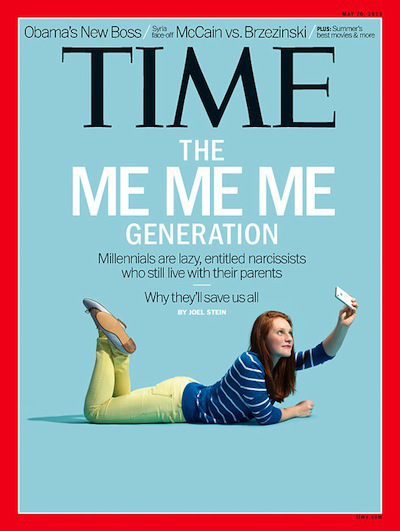Aug 1, 2014
Narcissism and Social Media
I’m sure we all remember the famous Time Magazine cover and featured article, published last year and shown above, about the Millennial generation. The photo of the teenager taking a “selfie” on her mobile phone was an image widely and humorously understood by middle age people around North America. Most would agree that the narcissism demonstrated by posts on social media is revealing a tipping point in mainstream culture.
It’s About Me!
An interesting challenge with the current narcissistic use of social media is that it is no longer confined to young people. I recently performed a simple content analysis of posts by friends of my Facebook account. Most of my friends on Facebook are near my age and generation, save some teens and college age students that are friends of my own children. I categorized all of the posts into one of two rudimentary categories: 1) posts that were inherently “other-centered“, meaning that they were posting something of value to others, such as new content, fresh perspective, or some other benefit to viewing the post, and 2) posts that were inherently “self-centered“, meaning that they were either a selfie, or an image of an individual consumed in an activity that was all about themselves. Not surprising, about 85% of the posts that I watched over one week time period were in the category of “self-centered”. And, they were not limited to young people, but included posts from all generations of users. And, in full disclosure, some of my posts fell into the same category, combining my Twitter and Facebook feed.
The Benefits of Social Media
Before I start to sound like a luddite, I want to confess that I love most social media (except for Facebook, which tends to drive me mad). Social media has given our culture so many great benefits, such as maintaining connection to those we love and care for despite the challenges of time and space. It has given us ways to collaborate and connect with people we have never physically met, and grow our understanding of the world around us without visiting every nook and cranny of the world. And, wow, the power of social media to place power in the hands of the masses and shine a light on the evils in our world is well-documented, with events such as the Arab Spring and others. Social media has unlocked some incredibly valuable assets to our culture and most would agree has the potential to address social issues, connect people better, and make our world a better place.
It’s Not About Me!
Culturally, we have fallen into a narcissistic trap when it comes to social media. We are not setting a great example to harness social media for the real power it possesses. It is being overused to promote an individual and self-consumed view of the world, focusing on what people possess (that others don’t), where they visit (when others can’t), and how they look (when the picture is taken for the 10th time from the best angle and optimal light). It is a very hollow, shallow view of communicating in a brave new world wrought with many societal challenges.
Unleashing the Power
If we as educators are trying to inspire the next generation of other-centered, thoughtful, intentional, global citizens, we need to start by setting the best example for the use of social media. I think it starts with acknowledging the inherent power of social media to connect others and collaborate toward a stronger, more ethical world. Social media has the power, when focused on others and real issues, to shine a light on bad and inspire good universally.
I think a good rule of thumb for posting, for both individuals and organizations, in the future is to ask these simple questions before you click “post”:
“Who benefits from this post? Does this post add value to others and contribute to our culture?”
I’m guessing the scholar in me is continuing to emerge in my theme. I was taught in graduate school that the point of research and scholarship is “huerism“, or adding to the body and value of knowledge over time. I’m borrowing on that theme as it relates to building the largest archive of data the world has witnessed through social media. Imagine the power of social media if it were harnessed to be other-centered?
Now, feel free to keep taking selfies. You just don’t have to post them. Sometimes, photos were meant only to be seen by those who took them for memories sake.

